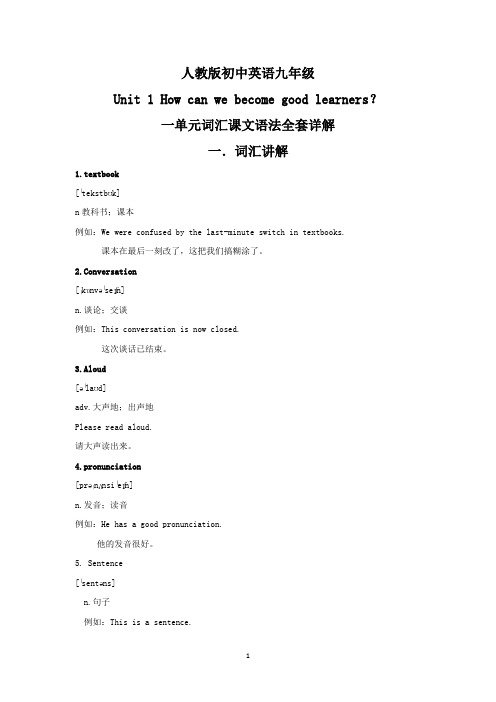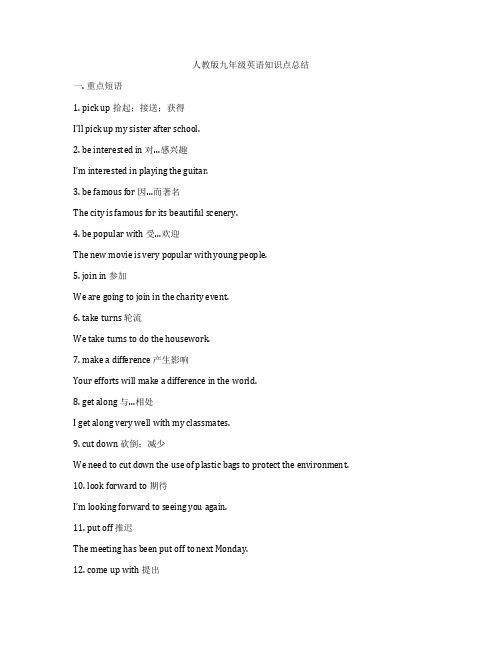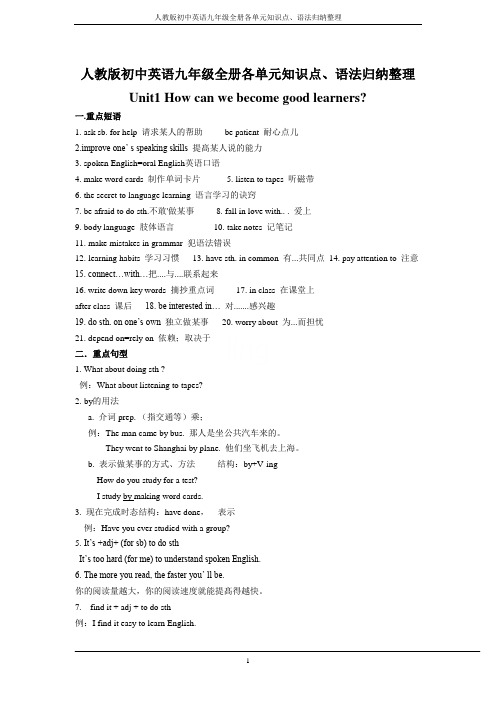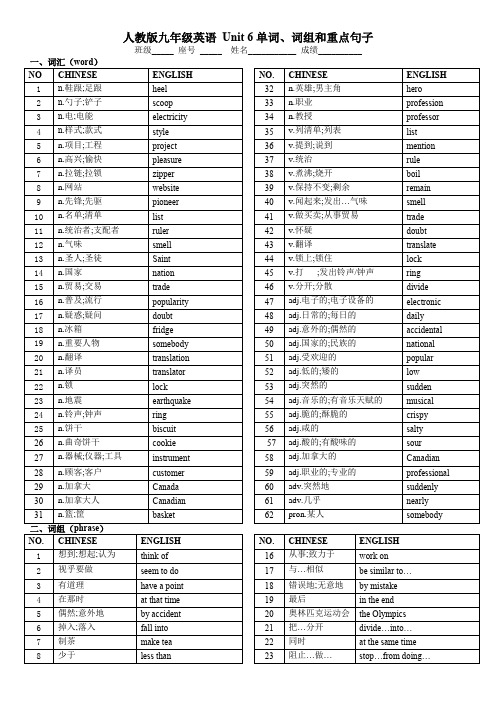人教版初中九年级重点词汇详解
人教版初中英语九年级一单元词汇要点语法全套解析

人教版初中英语九年级Unit 1 How can we become good learners?一单元词汇课文语法全套详解一.词汇讲解1.textbook[ˈtekstbʊk]n教科书;课本例如:We were confused by the last-minute switch in textbooks.课本在最后一刻改了,这把我们搞糊涂了。
2.Conversation[ˌkɒnvəˈseɪʃn]n.谈论;交谈例如:This conversation is now closed.这次谈话已结束。
3.Aloud[əˈlaʊd]adv.大声地;出声地Please read aloud.请大声读出来。
4.pronunciation[prəˌnʌnsiˈeɪʃn]n.发音;读音例如:He has a good pronunciation.他的发音很好。
5.Sentence[ˈsentəns]n.句子例如:This is a sentence.这是一个句子。
6.Patient[ˈpeɪʃnt]n.病人;adj.有耐心的例句:Louise was very patient with me when I was ill and crabby.在我生病并且脾气乖戾的日子里,路易斯对我很有耐心。
7.Expression[ɪkˈspreʃn]n.表达;表示;表达方式例句:she looked at her plate with an expression of disgust.她看着她的盘子,脸上露出很厌恶的表情。
8.Discover[dɪˈskʌvə(r)]V.发现,发觉例句:In the 19th century,gold was discovered in California 19世纪时,在加利福尼亚发现了金子。
9.Secret[ˈsiːkrət]adj.秘密的;保密的;n.秘密;秘诀;例句:Soldiers have been training at a secret location.士兵们一直在一个秘密场所训练。
人教版九年级英语重点知识梳理词汇_短语句型语法

九年级英语知识点Unit 1I、重点短语:1.lisen to tapes 听录音2. ask the teacher for help 向老师请求帮助3. read aloud 朗读4. speaking skills 口头表达能力5.spoken English英语口语6. end up 结束ter on 以后,随后8. make mistakes 犯错,出错ugh at嘲笑,取笑10.take notes 做笔记,做记录11.look …up (在词典、参考书等中)查阅,查找12. make up 编造,组成13.deal / do with 处理,应付14.be angry with生……的气15.go by (指时间)过去,消逝16.try one’s best to do sth. 尽力做……17.break off 突然中止,中断18. with the help of 在……的帮助下19.regard…as…把……当做……20.be afraid of doing / to do sth 害怕做某事21. first of all 首先,开始22. have trouble / a difficult / hard time doing sth.做某事有困难II、重点句型:1.It’s too hard to understand the voices. 理解那些话有困难。
(It’s too ...to ....)2. How do you study for a test? I study by listening to tapes.我通过听磁带学习。
(by )3. Studying grammar is a great way to learn a language.(动名词做主语谓语用单数)4.I was afraid to speak in class. 我害怕在课堂上说话。
人教版九年级上册英语Unit3重点知识详解

人教版九年级上册英语Unit3重点知识详解一、【重点词汇】1.重点单词(1)形容词central中心的;中央的The Central Park is not far from the railway station.中央公园离火车站不远。
fascinating迷人的;极有吸引力的Madagascar is the most fascinating place I have ever been to.马达加斯加是我去过的最迷人的地方。
convenient便利的,方便的Venice has convenient watertransportation. 威尼斯水上交通便利correct正确的;恰当的Only one of the answers is correct.只有一个答案是正确的。
polite有礼貌的;客气的Mary is a very polite child.玛丽是一个很有礼貌的孩子。
direct直接的;直率的We pay all our bills by direct debit.我们用直接借记的方式支付所有账单。
indirect间接的He took an indirect route back home.他选择了一条迂回的路线回家。
impolite 不礼貌的;粗鲁的It's impolite to speak up to the old.对老年人大声说话是不礼貌的。
underground地下的Underground resources are particularly rich地下资源尤其丰富。
(2)副词normally通常;正常情况下Normally,he can work out the problem.正常情况下,他能解出这道题。
politely 礼貌地;客气地The waiters in the supermarket always treat customers politely.超市的服务员总是很有礼貌地对待顾客。
人教版九年级英语知识点总结

人教版九年级英语知识点总结一. 重点短语1. pick up 拾起;接送;获得I’ll pick up my sister after school.2. be interested in 对…感兴趣I’m interested in playing the guitar.3. be famous for 因…而著名The city is famous for its beautiful scenery.4. be popular with 受…欢迎The new movie is very popular with young people.5. join in 参加We are going to join in the charity event.6. take turns 轮流We take turns to do the housework.7. make a difference 产生影响Your efforts will make a difference in the world.8. get along 与…相处I get along very well with my classmates.9. cut down 砍倒;减少We need to cut down the use of plastic bags to protect the environment.10. look forward to 期待I’m looking forward to seeing you again.11. put off 推迟The meeting has been put off to next Monday.12. come up with 提出We need to come up with a plan for the project. 13. keep in touch 保持联系We keep in touch by sending emails.14. make up 编造;弥补She made up a story about why she was late.15. run out of 用完We have run out of milk and need to buy some more.二. 重点语法1. 一般现在时肯定句:主语 + V原 + 其他He plays football every weekend.否定句:主语 + do not/does not + V原 + 其他I do not like watching horror movies.疑问句:Do/Does + 主语 + V原 + 其他Do they enjoy playing basketball?2. 一般过去时肯定句:主语 + V-ed/Vt + 其他She visited Beijing last year.否定句:主语 + did not + V原 + 其他We did not go to the concert last night.疑问句:Did + 主语 + V原 + 其他Did you finish your homework yesterday?3. 现在进行时肯定句:主语 + am/is/are + V-ing + 其他She is watching TV now.否定句:主语 + am/is/are + not + V-ing + 其他He is not playing football at the moment.疑问句:Am/Is/Are + 主语 + V-ing + 其他Are you studying for the exam?4. 一般将来时肯定句:主语 + will + V原 + 其他She will travel to Japan next month.否定句:主语 + will not + V原 + 其他I will not forget to call you.疑问句:Will + 主语 + V原 + 其他Will he come to the party?5. 现在完成时肯定句:主语 + have/has + V过去分词 + 其他They have finished their homework.否定句:主语 + have/has + not + V过去分词 + 其他We have not seen this movie yet.疑问句:Have/Has + 主语 + V过去分词 + 其他Have you ever been to Paris?6. 被动语态肯定句:主语 + am/is/are + V过去分词 + 其他The book is written by my favorite author.否定句:主语 + am/is/are + not + V过去分词 + 其他The dishes are not washed by my brother.疑问句:Am/Is/Are + 主语 + V过去分词 + 其他Is the car fixed by the mechanic?三. 重点词汇1. 人物teacher 老师student 学生doctor 医生nurse 护士engineer 工程师pilot 飞行员musician 音乐家actor 演员writer 作家scientist 科学家athlete 运动员2. 动作run 跑步jump 跳跃swim 游泳dance 跳舞sing 唱歌play 演奏climb 爬山cook 烹饪paint 绘画ride 骑行3. 环境house 房子school 学校hospital 医院office 办公室library 图书馆park 公园beach 海滩mountain 山river 河lake 湖四. 重点句型1. 八大情态动词can 能够I can speak English fluently.could 过去能够She could play the piano when she was five. may 可能May I go to the restroom, please?might 可能It might rain this afternoon.must 必须You must finish your homework before 8pm. shall 将要Shall we go to the movies tonight?should 应该You should study for the exam tomorrow.will 将要We will visit the Great Wall next week.2. 祈使句Be quiet! 安静!Don’t be late! 别迟到!Sit down, please. 请坐下。
人教版初中英语九年级全册各单元知识点、语法归纳整理

人教版初中英语九年级全册各单元知识点、语法归纳整理Unit1 How can we become good learners?一.重点短语1. ask sb. for help 请求某人的帮助be patient 耐心点儿2.improve one’ s speaking skills 提髙某人说的能力3. spoken English=oral English英语口语4. make word cards 制作单词卡片5. listen to tapes 听磁带6. the secret to language learning 语言学习的诀窍7. be afraid to do sth.不敢'做某事8. fall in love with.. . 爱上9. body language 肢体语言10. take notes 记笔记11.make mistakes in grammar 犯语法错误12.learning habits 学习习惯13. have sth. in common 有...共同点14. pay attention to 注意15. connect…with…把....与....联系起来16. write down key words 摘抄重点词17. in class 在课堂上after class 课后18. be interested in… 对.......感兴趣19. do sth. on one’s own 独立做某事20. worry about 为...而担忧21. depend on=rely on 依赖;取决于二.重点句型1. What about doing sth ?例:What about listening to tapes?2.by的用法a. 介词 prep. (指交通等)乘;例:The man came by bus. 那人是坐公共汽车来的。
人教九年级全册单词解析和拓展

九年级全册单词解析与拓展[教师版]Unit 1 How can we become a good English learner?Period 1 Section A(1a-2d)单词解析与拓展1. textbook n.教科书;课本a medical textbook 医学教科书2. conversation n.交谈;谈话have conversations with sb. 与某人交谈/谈话Don was deep in conversation with the girl on the right. 唐与他右边的女孩深入交谈。
I learnt conversational Spanish at the evening classes. 我在夜校学过西班牙会话。
3. aloud adv.大声地;出声地read aloud大声读loud adj. 大声的;adv.大声地loudly adv. 大声地,响亮地4. pronunciation n.发音;读音a guide to English pronunciation 英语发音指南Your pronunciation is excellent. 你的发音好极了。
pronounce v.发音Very few people can pronounce my name correctly. 很少的人能把我的名字念正确。
She pronounced him the winner of the competition.她宣布他是竞赛的优胜者。
5. patient adj. 有耐心的n.病人A patient is a person who is received medical treatment, especially in a hospital.be patient with sb.对某人有耐心She is very patient with young children.她对幼儿特别有耐心。
Unit6单词短语重点句子人教版英语九年级全册

人教版九年级英语Unit 6单词、词组和重点句子班级_____ 座号_____ 姓名___________ 成绩__________1. 是什么时候发明的?我想它是在1876年发明的。
When was the telephone invented?I think it was invented in 1876.2. 带有灯的鞋是被用来做什么的?它们是被用来在黑暗中看东西。
What are shoes with lights used for?They are used for seeing in the dark.3. 据说一位叫神农的中国统治者是第一个发现茶可以作为一种饮品的人。
It is said that a Chinese ruler called Shen Nong was the first to discover tea as a drink.4. 世界上最受欢迎的饮品是偶然间被发明的。
The most popular drink in the world was invented by accident.5. 人们认为茶是在6世纪和7世纪期间被带到韩国和日本的。
It is believed that tea was brought to Korea and Japan during the 6th and 7th centuries.6. 不同的作家把这本书翻译成了不同的语言。
Different writers translated the book into different languages.7. 人们认为历史上的第一场篮球赛是在1891年12月12日举办的。
It is believed that the first basketball game in history was played on December 21,1891.8. 王博士把他班上的男生分成了两队,并教他们玩他的新运动。
人教版英语九年级全册Unit6核心常考词汇详解

人教版英语九年级全册Unit6核心常考词汇详解Unit6核心常考词汇详解1.invent (v.)发明;创造invent指发明创造出自然界本来不存在的东西,如工具、方法、手段、汽车、电器、合成材料等。
【备课例句】Bell invented the telephone. 贝尔发明了电话。
Smith invented a new teaching method. 史密斯发明了一种新的教学方法。
【横向辐射】discover, find, create1.discover是“发现”的意思,是指发现原来就有而一直没被发现,如发现电、煤、石油等矿藏及新星、星系或科学真理等。
Columbus discovered America in 1492.1492年哥伦布发现了新大陆。
Recently they have discovered a comet. 最近他们发现了一颗彗星。
2.find的意思是“寻找”,强调找的结果,并不指发现。
I've tried to find another copy but couldn't find one. 我试图再找一本,但没能弄到。
3.create指有目的地把原材料制成新产品,也指创造出原来不存在的或与众不同的事物。
Man creates himself. 人类创造了自己。
A novelist creates characters and a plot. 小说家塑造人物并设计情节。
【课堂变式】根据语境提示,用invent, discover,find或create的形式填空,完成句子。
1.When _____ the stream engine(蒸汽机)___?2. I can’t ____ my bike, I’m looking for it.3. Scientists are now trying to ___ if this is possible.4. Do you know who______ the plane?5. He ____quite a number of wonderful characters in his play.【解析】I.1.was, invented 2.find 3.discover 4.invented 5. created2. be used for 用来做……此短语中的for是介词,表示用途,后接名词或动词-ing形式。
- 1、下载文档前请自行甄别文档内容的完整性,平台不提供额外的编辑、内容补充、找答案等附加服务。
- 2、"仅部分预览"的文档,不可在线预览部分如存在完整性等问题,可反馈申请退款(可完整预览的文档不适用该条件!)。
- 3、如文档侵犯您的权益,请联系客服反馈,我们会尽快为您处理(人工客服工作时间:9:00-18:30)。
• 9. achieve + sth. vt. 成就/ 完成某事 *10. realistic adj. 现实的;注重实际的 • real adj. 真的;真正地 • really adv. 真正地 • realize vt. 使实现;使变成真实、现实;实 现 • reality n. 现实 11. care about 担心;关心 • care for 照顾;关心 12. point n. 要点;论点 • There’s no point doing sth. 没必要做…
• 11. laugh at 嘲笑;取笑 12. sentence n. 句子 • vt. 宣判 • sentence ab. to ……宣判某人…徒刑 • sentence sb. to death宣判某人死刑 • He was sentenced to three years in jail. • 他被判三年监禁。 13. take notes (of…) 做笔记;做记录 14. impress v. 是感动;是印象深刻 • impress sb….令人印象深刻 • sb. be impressed by/ with sth.某人对某事印象 • 深刻
• 12. attention n. 注意;专心;留心 pay attention to 对…注意;留心 • draw one’s attention to吸引某人的注意 • =attract one’s attention to • focus (one’s) attention on集中注意力于… 13. give up (doing sth.) 放弃;不一致;意见 不合 14. a waste of time/ money 浪费时间/钱
• 6. end up 结束;告终 • end up with…以…结束 • end up doing….结果;最终 7. make mistakes / a mistake 犯错;出错 8. realize v. 认识到;了解到;实现 9. matter v. 重要;要紧;有关系 It doesn't matter 没关系 • What he often says matters a lot. • 他常说的很重要。 10. afraid adj. 害怕的;犯愁的 be afraid to do害怕去做某件具体的事情 • be afraid of doing sth. 害怕做某事 be afraid + that 从句
• • • • • • • • • • • •
9. herself pron. (反身代词)她自己;她本身 himself 他自己 itself 它自己 themselves 他们自己 yourself 你自己 yourselves 你们自己 myself 我自己 ourselves 我们自己 注:第一、第二人称的反身代词由“形容词 性物主代词+self/ selves”构成;第三人称的反身 代词由“人称代词宾格+self/ selves”构成。单数 self, 复数selves.
• 6. cause v. 造成;导致;使发生 7. necessary adj. 必须的;必需的 8. to one's surprise 令某人惊奇的是… 9. even though / if 即使;纵然;尽管 10. no longer 不再;已不 • =not …any longer 11. take pride in (≈be proud of) 对…感到 自豪
• • • • • • • • • • • • • •
14. plenty pron. 充足;大量 plenty of 大量的;充足的(可数/不可数) a quantity of / quantities of 很多的;大量的 (可数/不可数) a lot of = lots of 很多的(可数/不可数) a number of 很多的(可数) a great deal of 很多的(不可数) an amount of 大量的 (不可数) much 多的;大量的(不可数) quite a little 很多的(不可数) many 许多的(可数) a good many (许多的)可数 many a + 单数 许多的(可数) quite a few 很多的(可数)
• 15. trouble n. 困难;苦恼;忧虑 • be in trouble 陷入困境 16. look up (在词典、参考书等中)查阅,查找; • 抬头看 17. deal with …处理…;应付… • Have you ever delt with such a situation? • How did you deal with the accident? • do…with…处理… • What did you do with the broken glass? • He did nothing with what had happened.
• • • • • • • • • • • • •
23. lose (lost, lost) v. 失去;丧失 lost 迷路的;遗失的 loss 损失 at a loss处于失落/不知所措的状态 24. try one's best =try one’s hard 尽力做… 25. face n.脸;面部 v. 面临;面对;正视 be faced with/ by…面临… face to face面对面 26. break off 突然中止;中断 break out (战争等)爆发 break through 突破 break down 出故障,坏掉;失败 break away from…脱离… break in vi.闯入(行窃) break into vt.闯入…… break up打破… *27. psychologist n. 心理学家;心理学研究者
• Unit 3 • instead of + doing/ n./pron. 代替…;而不是… • instead, + 从句/ 从句 + instead 反之;取而代之 的是…;而是 • 辨析: • He stay at home the whole day instead of going • out. • He didn’t go out. Instead, he stayed at home the whole day. • =He didn’t go out. He stayed at home instead.
• • • • • • • • • •
18. regard v. 将…视为 regard…as…把…当做…; 认为….是… look on/ upon …as…把…视为… treat…as…把…当…对待 think of/about…as…认为…是… consider…(to be)…认为…是… 19. duty n.义务 on duty 值日 20. influence v. 影响;对…起作用 have a good/bad influence on…对…有影响 21. be angry with≈be mad with… 生…的气 • 22. go by (指时间)过去;消逝
• 7. reply v. 回答,答复;回应 • n. 答复;回答;回应(指口头护着笔头回 答;做某事来回应别人) • answer vt. n. 回答(问题或提议);回(电 话、 • 来信等);答案 • respond vt. 回应;反应(对别人说的活做 的做 • 出反应) response n.
• 10. bother v. 使恼怒;打扰 (+sb.) 11. not...in the slightest 一点也不;根本不 =not at all 12. annoy v. 使生气;使恼怒 +sb./ sth. • annoyed adj. (感到)恼怒的 • annoying adj. 令人恼怒的 13. fairly adv. 相当地;还算 • rather adv. 相当地 • quite adv. 十分地;很 • pretty adv. 十分地(+褒义词)
• • • • • • • • • •
8. in the way 当道的;妨碍人的 on the way 在路上;即将来临 by the way 顺便说/问 in this/that/ the way 以这/ 那种方式 in a way 某种程度上 in some way 以某种方式 Come this way. 往这边走。 the way… …的方式 make one’s way to…朝…走;找到(去…)的 出路
• 2. stay up 不睡觉;熬夜 3. concentrate v. 集中;聚集 concentrate on… 全神贯注;专心于… 4. at present 目前;现在 *5. opportunity n. 机会;时机 6. mess n. 混乱;脏乱 • be in a mess一团糟 • mess sth. up/ mes up sth. 弄砸某事;出错 • He messed everything up.他弄砸了一切。
• • • •
• • • • •
7. confident adj. 自信的;有把握的 confidence n. 信心 (be) full of confidence 信心十足 be of confidence 有信心的 8. permission n. 允许;许可;准许 permit vt. 批准;(正式)允许 permit sb. to do sth. allow vt. 允许;让…有… allow sb. to do sth. 允许某人做某事 be allowed to do sth. 被允许做某事
• Unit 4 1. medical adj. 医学的;医疗的 medicine n. (内服)药 • Take the medicine three times a day. • 2. research n. 研究;调查 • do the research 进行研究 3. tie n. (=necktie)领带 • tie … to…把…拴/系到…上 4. worry n. 烦恼;忧虑 • worry about… 5. what if 如果…将会怎么样 6. energetic adj. 有活力的;精力充沛的
